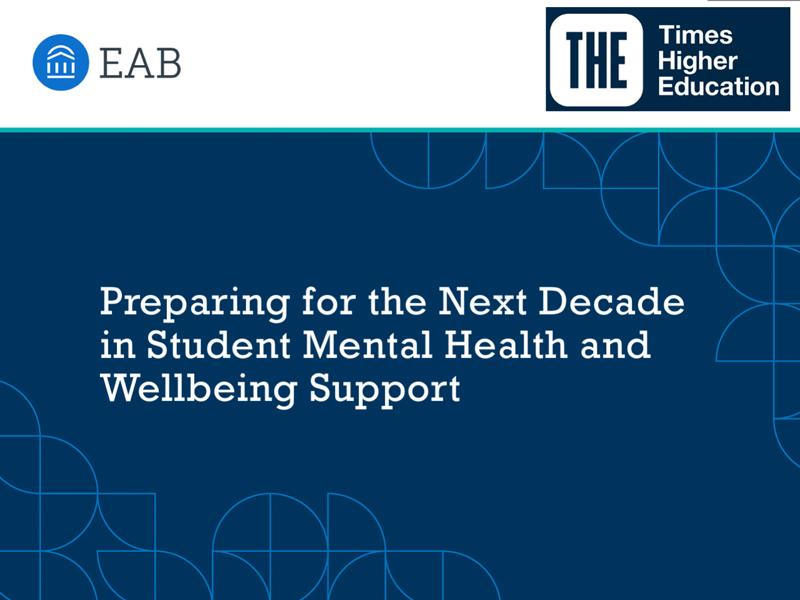Universities should develop institution-wide strategies and implement a range of mental health and well-being services, which are increasingly important for students to flourish now and in the future.
During a Times Higher Education webinar, held in partnership with EAB, a panel of leaders from UK and Irish higher education institutions discussed how universities can prepare for the next decade in student mental health and well-being support.
Chair Jennifer Latino, senior director of research advisory services at EAB, said it was vital for universities to be prepared to meet student needs.
“We’re really looking at the next 10 years of support for students, identifying exemplary practices that universities have been putting in place and also looking at how we need to be ready for the changing needs of our students,” she said.
After the Covid-19 pandemic brought student mental health to the top of university agenda, many institutions shifted their strategies. This included adopting new technology platforms to enhance the accessibility of support, expanding the use of virtual environments and developing initiatives like additional drop-in counselling opportunities, hybrid counselling and group therapy.
While the worst of the pandemic appears to be over, student needs are only going to increase. Latino said 74 per cent of UK university students reported their mental health had been negatively impacted by the pandemic. To address this, institutions across the world have increased their investment in well-being, including creating dedicated strategic plans, recruiting chief wellness officers, embedding well-being content into curricula, providing peer counselling and investing in wellness-centred building design.
“In many ways this is our moment because it’s the time for universities to really show up and put more resources, more talent and more time into providing resources and support around student mental health and well-being,” Latino said.
At Trinity College Dublin, the university operates a stepped-care model for student well-being, offering a range of support and services across 10 steps to identify where student care should come from.
Like others, the university had seen a “surge” in demand for services, said Trish Murphy, director of student counselling services at Trinity College Dublin. Student counselling services, which typically see 10 per cent to 12 per cent of the student population, saw 15 per cent last year, with “crisis demand” up 40 per cent.
“We certainly use our step care model. We do lots of very creative interventions across the college. But I think we need to continuously grow the model that we’re offering. And we need to get everybody to see how relevant it is, how therapeutic it is, and how it’s best practice,” said Murphy.
Jackie Main, director of student life at Glasgow Caledonian University, said the university had been an “early adopter” in developing an institutional approach to student and staff mental health and well-being. While well-being teams would welcome more staff to cope with increasing student demand, Main said an institution-wide approach would be more sustainable and effective.
“We have to be more systemic. And we have to look at more interventions early on and prevention,” she said.
Paula Coonerty, executive director for education and student success at the University of Bristol, said the university was attempting to “deepen its approach” to an institution-wide strategy for well-being.
“We’re looking end-to-end as an institution, horizontally and vertically, figuring out how we make Bristol a place that has a positive well-being environment for staff, which is critical, and for students as well,” she said.
The panel:
- Paula Coonerty, executive director for education and student success, University of Bristol
- Jennifer Latino, senior director, research advisory services, EAB (chair)
- Jackie Main, director of student life, Glasgow Caledonian University
- Trish Murphy, director of student counselling services, Trinity College Dublin
Watch the webinar on-demand here.
Find out more about EAB.


comment